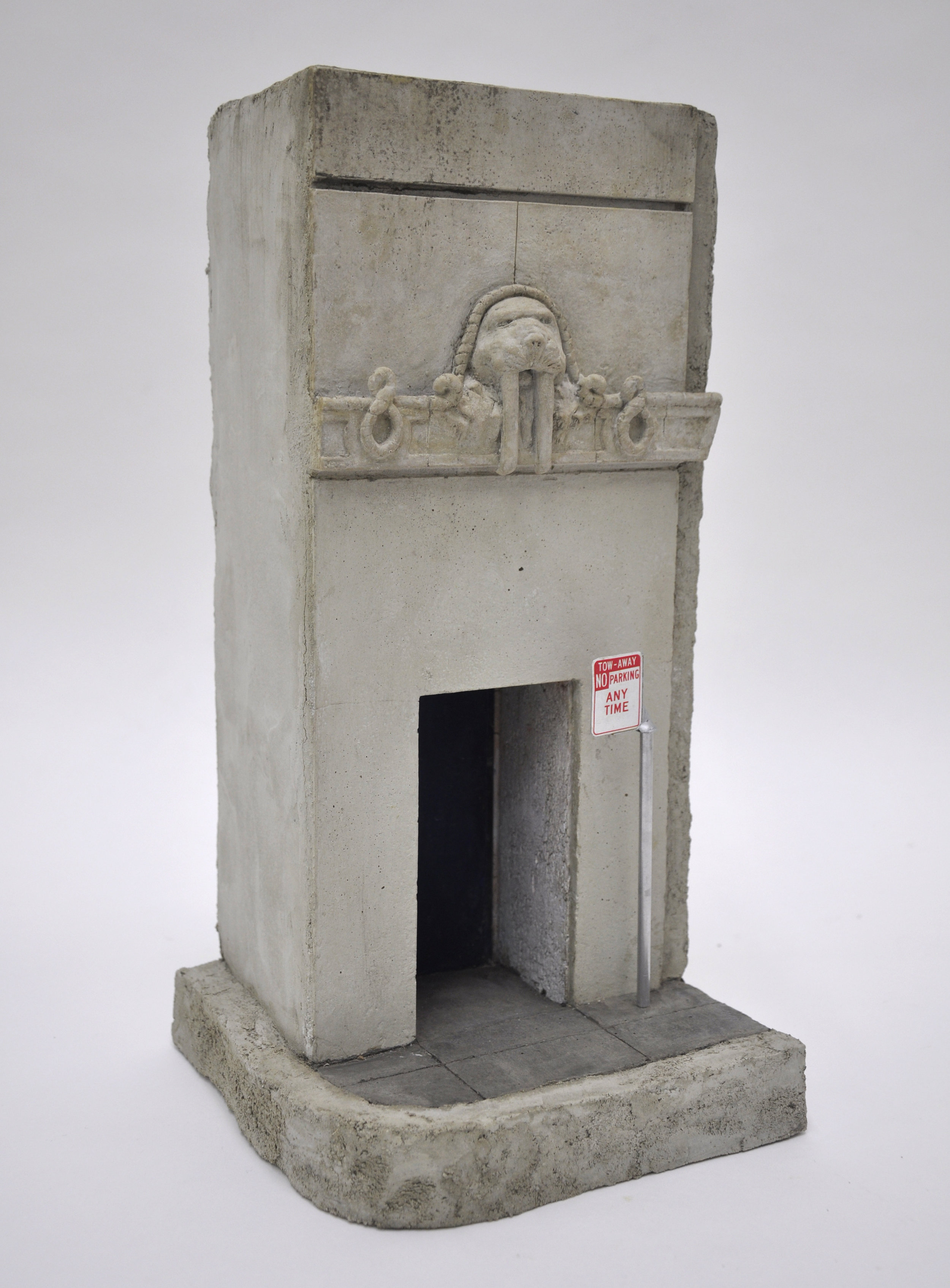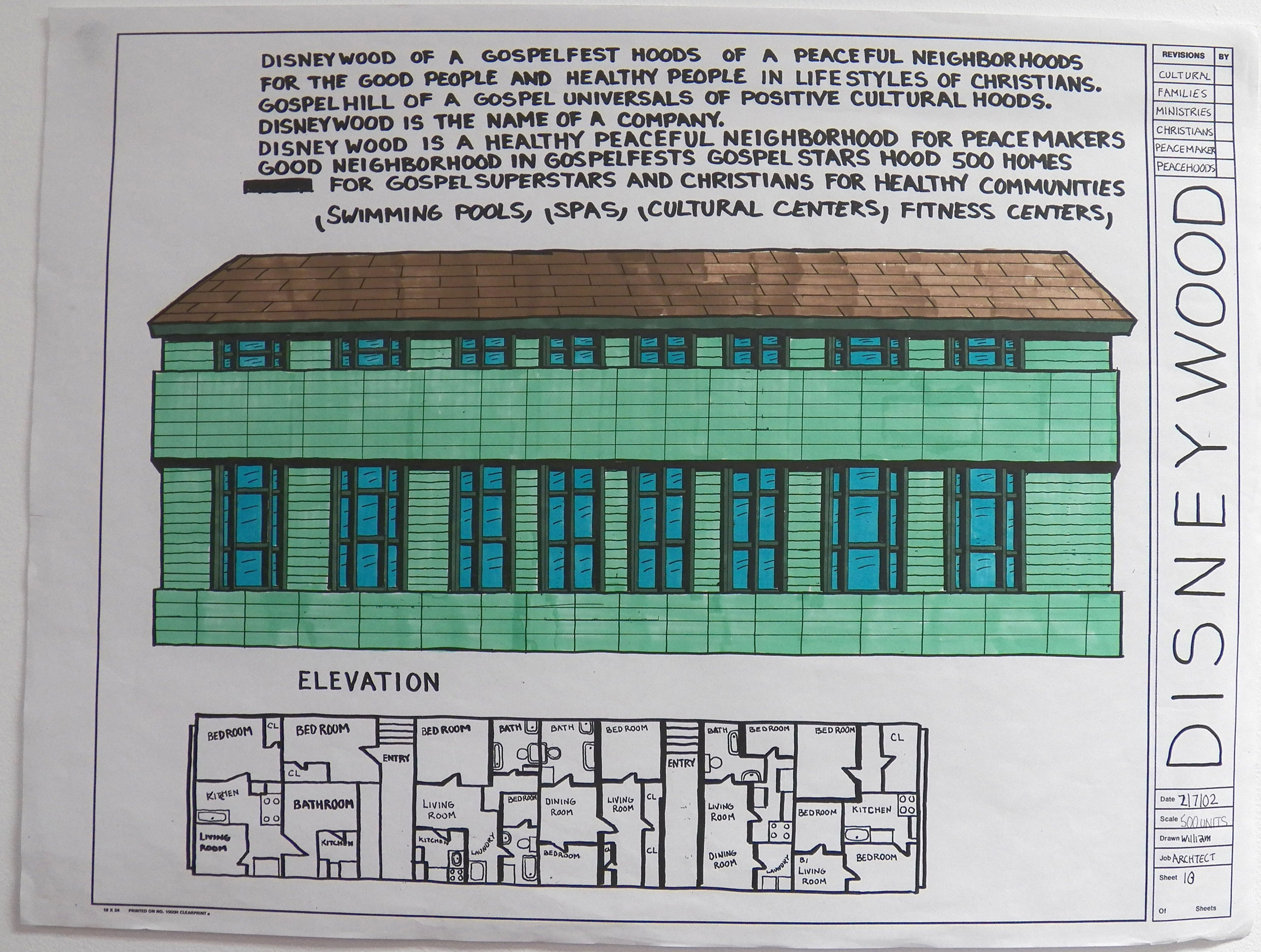Skyline Friendly Organizations | Malcolm Kenter & William Scott
Skyline Friendly Organizations
Malcolm Kenter & William Scott
Curated by: Nick Makanna
Opening Reception: Saturday January 19th, 6 – 9pm
Exhibition Dates: January 19th – February 16th, 2019
Without a point of reference, Skyline Friendly Organizations could resemble a kind of flowery euphemism for urban planning–a sensibility woven through the work of both Malcolm Kenter and William Scott. More specifically however, Skyline Friendly Organizations and “Inner Limits” are monikers that reappear in Scott’s paintings and drawings, adorning the sides of governmental spacecraft appointed with the task of returning wholesome people back from the dead to populate “Praise Frisco”–a redeveloped utopian San Francisco engineered for the peaceful lives of all its citizens. If that seems like a lot to take in all at once, welcome to the beautiful world created by William Scott. Though vastly different in background and lived experience, artists Malcolm Kenter and William Scott are inherently tied as native sons of San Francisco, and their work calls forth the places that have shaped them–remembering, rehashing and inventing anew.
WILLIAM SCOTT, UNTITLED (WS 157), INK ON PAPER, 11 X 8.5IN, 2023
MALCOLM KENTER, POLICE BOX 1, ENAMEL ON WOOD, FOAM, PLASTIC, CEMENT, CHEWING GUM, 61” X 15” X 15”, 2019
WILLIAM SCOTT, UNTITLED (WS 186), INK ON FOUND IMAGE, 20” X 30”, 2005
WILLIAM SCOTT, UNTITLED (WS 142), ACRYLIC ON CANVAS, 40” X 55”, 2013
MALCOLM KENTER, AG PHARMACY / STORAGE, ENAMEL AND LATEX ON WOOD, CEMENT, METAL, GLASS, PLASTIC, SAND, 27.5” X 18.5” X 27”, 2017
MALCOLM KENTER, FIRE / POLICE BOX, ENAMEL ON WOOD, FOAM, PLASTIC, CEMENT, CHEWING GUM, 62.5” X 24.5” X 27”, 2019
MALCOLM KENTER, 49ERS LIQUOR AND GROCERIES, LATEX ON WOOD, METAL, PLASTIC, 26” X 18.5” X 16”, 2017
WILLIAM SCOTT, UNTITLED (WS 099), ACRYLIC ON PAPER, 18” X 24”, 2003
MALCOLM KENTER, WESTERN EXTERMINATOR, ENAMEL ON PLASTICINE, 4” X 8” X 3”, 2019
MALCOLM KENTER, WALRUS FAÇADE, ENAMEL ON CEMENT, FOAM, METAL, PAPER, 7” X 14” X 7”, 2019
MALCOLM KENTER, SUPER SAVE, ENAMEL AND LATEX ON PLASTIC, FOAM, 9” X 8” X 1”, 2019
MALCOLM KENTER, WESTLAKE, LATEX AND ENAMEL ON WOOD, FOAM, 6” X 2” X 3”, 2019
MALCOLM KENTER, DOGGIE DINER, ENAMEL ON PLASTICINE, 3” X 3” X 2”, 2019
MALCOLM KENTER, SAVE ON GLASS, ENAMEL ON PLASTIC, METAL AND CONCRETE, 7” X 2.5” X 5”, 2019
MALCOLM KENTER, VIVANDE, CEMENT, WOOD, GLASS, PLASTIC, 5.5” X 10” X 3”, 2019
MALCOLM KENTER, POLICE BOX MINI, ENAMEL ON PLASTIC, CEMENT, WOOD, 3.5” X 3” X 8.5”, 2019
MALCOLM KENTER, THE LONE HORSE, ENAMEL ON PLASTICINE, WOOD, LATEX, PLASTIC, 14” X 1” X 7”, 2019
MALCOLM KENTER, JOLLIBEE E. RODRIGUEZ, ENAMEL ON PLASTICINE, 2” X 1.5” X 3”, 2019
MALCOLM KENTER, THE GREAT ROOT BEAR, ENAMEL ON PLASTICINE, 2.5” X 1” X 3”, 2019
MALCOLM KENTER, FIRE BOX 2, ENAMEL ON WOOD, FOAM, PLASTIC, CEMENT, CHEWING GUM, COVER, 52.5” X 11” X 14.5”, 2019
WILLIAM SCOTT, UNTITLED (WS 268), INK ON PAPER, 15” X 11.5”, 2018
MALCOLM KENTER, THE SAND CASTLE, ENAMEL AND LATEX ON WOOD, CEMENT, PLASTIC, METAL, GLASS, DIRT, NFS, 18” X 27” X 26.5”, 2017
WILLIAM SCOTT, UNTITLED (WS 128), INK ON PAPER, 18” X 24”, 2007
MALCOLM KENTER, BIKE LANE, ENAMEL ON CONCRETE, WOOD, 32” X 50.5” X 1”, 2018
WILLIAM SCOTT, UNTITLED (WS 216), UNDATED, INK ON PAPER, 8.5” X 11”
WILLIAM SCOTT, UNTITLED (WS 226), WATERCOLOR AND ACRYLIC ON PAPER, 14.75” X 19.75”, 2005
WILLIAM SCOTT, UNTITLED (WS 091), WATERCOLOR AND ACRYLIC ON PAPER, 18” X 24”, 2012
MALCOLM KENTER, GAME WELL BOX, LATEX ON PLASTICINE, WOOD, FOAM, PLASTIC, 34.25” X 10” X 28”, 2019
MALCOLM KENTER, FIRE BOX 1, ENAMEL ON WOOD, FOAM, PLASTIC, CEMENT, CHEWING GUM, 68” X 15” X 15”, 2019
MALCOLM KENTER, BAYVIEW OPERA HOUSE STUDY 1 & 2, ENAMEL AND LATEX ON CONCRETE AND WOOD, 12.5” X 12.5” X 3”, 2019
MALCOLM KENTER, BAYVIEW OPERA HOUSE STUDY 1 & 2, ENAMEL AND LATEX ON CONCRETE AND WOOD, 12.5” X 12.5” X 3”, 2019
WILLIAM SCOTT, UNTITLED (WS 135), ACRYLIC ON PAPER, 15” X 20”, 2006
MALCOLM KENTER, POLICE BOX 2, ENAMEL ON WOOD, FOAM, PLASTIC, CEMENT, CHEWING GUM, 62.5” X 15” X 15”, 2019
MALCOLM KENTER, VILLA AROMA, LATEX ON LINOLEUM, PLASTIC, METAL, CONCRETE, FABRIC, 25” X 12.5” X 3.5”, 2019
WILLIAM SCOTT, UNTITLED (WS 046), UNDATED, ACRYLIC ON PAPER, 24” X 19”
WILLIAM SCOTT, UNTITLED (WS 259), UNDATED, ACRYLIC ON PAPER, 20” X 15”
WILLIAM SCOTT, UNTITLED (WS 257), UNDATED, ACRYLIC ON PAPER, 20” X 15”
INSTALLATION VIEW | SKYLINE FRIENDLY ORGANIZATIONS
Whereas William Scott’s artistic output is concerned with envisioning a new San Francisco built on peace and love, Malcolm Kenter’s work functions as a kind of radical preservation–extricating often overlooked elements from San Francisco’s built environment, transposing them through altered scale and materiality, and presenting them in a confounding act that jogs our unconscious for a particular dusty facade we’ve passed hundreds of times yet never taken the time to revel in it’s drab grandeur. Odes to humble landmarks that defy the pomp and circumstance that so often accompany such spaces, the artist’s works force us to examine our surroundings with a renewed sensitivity. In a city so entrenched within a perpetual state of construction and reconstruction, Kenter’s works are lovingly un-romanticized still-lives of a fleeting cityscape–meditations on the subtle beauties that surround.
Born on the autistic spectrum in the Bayview–Hunter’s Point Neighborhood of San Francisco, William Scott has spent much of the past 30 years working in the studio at Creative Growth Art Center in Oakland. Preferring the title of architect over artist, Scott’s works are not drawings of an imagined San Francisco but latent architectural renderings intended for the redevelopment of San Francisco and the Bayview specifically as a utopian Gospel-Disneyland full of good people. Actively conflating time, space and even mortality, Scott’s plans are grounded in the philosophy that the pursuit of better buildings and enriched spaces can create new worlds that with them bring peace to earth–beliefs shared by so many visionary architects including Le Corbusier, Frank Lloyd Wright, etc. From reimagining the SFPD / Hall of Justice at 850 Bryant as the “Unique Positive Joyfull Loving Lifestyle Hall of Justice” complete with a diverse police force dancing in the streets, to creating new community centers and community housing in the Hunters Point Shipyard, a site riddled with decades of environmental racism–Scott’s architectural plans and portraiture are not fantasy to be taken lightly, but imaginative designs and pleas for a more just, peaceful and harmonious society within spaces infamous for their legacies of neglect and inequality.
Skyline Friendly Organizations as an exhibition speaks to the issues of how we as artists, residents and adherents to a sense of place adapt as vast forces outside of our control create indelible marks and alterations to the landscapes that have become so woven within our daily lives and our roaming unconscious. Both artist’s visionary work calls forth and questions the fixity of place, and serves as a reminder for all denizens of the Bay Area and abroad of the vast imagination and spiritual flexibility needed to not only sustain the alterations to our lived environments and surrounding landscapes, but to reenvision the places we want to live and see around us.







































